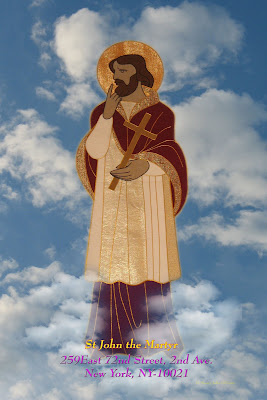 SAINT IGNATIUS
SAINT IGNATIUSSt. Ignatius was born in 1491. He was born in the Castle of Loyola. He died at Rome in 1556. Perhaps ironically, he died so suddenly he did not receive the last Sacraments which means you can become a saint even though you happen to die without the last Sacraments. He was canonized in 1622 and 300 years later was declared, by Pope Pius XI, the heavenly Patron of all retreats and spiritual exercises.
In the deepest sense of the word, Ignatius was a convert. He lived a life that was very worldly. We have official records of at least one illegitimate child. In other words, he was another Augustine a century later. He was a soldier by profession and, as later on he would at such length explain to his followers, God will do the most unexpected and unpleasant things in order to bring a soul to Himself. In Ignatius' case, he was fighting a war against the French. During a battle at Pamplona he was badly wounded; one of his legs was quite shattered. Incidentally the Spaniards, once Ignatius was wounded, fled. (He was their leader) Then months of convalescence; his convalescence converted him. You might say the Society of Jesus was born on a sick bed. He was a great reader of those days.The "Life of Christ" changed Ignatius' life After our Lady's first appearance to Ignatius he got surprisingly healed, which confirmed him in his mission. He always carried a limp to the day of his death, but he made a pilgrimage to the shrine of Our Lady of Monserrat, where he made his peace with God. Some distance away from Monserrat, in order to pull himself away from all worldly things to go into meditation, silence, he went to a cave called Manresa and, ever since for the last four hundred years, many retreat houses conducted by the Society of Jesus are called "Manresa."
Let me just say few features of great St. Ignatius' spirituality. There are many to mention but we will just think of three.
I. The first feature: is that the Person of Christ, the human being, the Son of Mary, Jesus of Nazareth, because He is God Himself in human form, that Man's virtues are God's attributes. Everything that Jesus did, from His crying as a Babe in the cradle to His getting tired and falling asleep, to His agony in the Garden, all of that is a pattern for us to imitate. Among the three titles that Christ gave Himself: "I am the Way the Truth and the Life," Ignatius concentrated on Christ the Way, the Model, the Pattern, the Example, the One Whom, if we follow we will become like Him and that means we will become holy.
II. Second Feature: Ignatius was a contemporary of all the major Protestant rebels: Luther, Calvin, Zwingli, Cranmer, all of them. And he saw that at rock bottom Protestantism was a rebellion against the Papacy. And as a consequence, the second notable feature of his spirituality is his own personal, great personal devotion to the person of the Holy Father and his teaching and preaching and insisting that you are only as good a Christian – and you dare not call yourself a catholic, unless you are loyal (that means obedient) to the Vicar of Christ.
III. Third feature: The cardinal heresy of the Western world is the denial of human freedom. Ignatius then, you would expect to stress man's free will. Of course we need divine help. We need divine light and strength, who doubts it? But we must want to cooperate and we are not coerced to do so. In Ignatius' vocabulary a saint is a person who wants to be a saint. It is both that simple and that awful. Hell is very real and it is no injustice, though it's a great mystery. Why not? Because God gave us a free will to either serve Him or reject Him. And if we want to, as every page of the Exercises brings out, we can be either just sufficiently cooperative with God's grace to keep out of hell – a big risk needless to say; you're taking a chance. That's why there could be only one motto for St. Ignatius which he bequeathed to his sons: "for the greater glory of God." That comparative degree is at the heart of Ignatius' spirit. Not just for the glory of God or the great glory of God, but the greater. "My friend," he would tell us, "exert yourself; push a little harder; do more."
"More than what?"
"More than you're doing."
"But I'm doing all that I can."
"Try harder!"
That's Ignatius. Because we have that all but almighty power called freedom. It is the power that can say "no" to the Almighty, or can say a weak, whimpering "yes" or can shout from the mountain tops, "YES."











